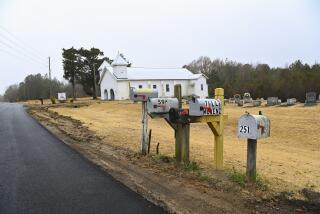He’s plugged into the new freedom to choose
- Share via
“If everything that exists has a place, place too will have a place, and so on ad infinitum.”
Aristotle
--
It’s not very often that the author of a book discussing economics and sociology for a general readership starts with a quote by the Greek philosopher Aristotle. But when the writer is the thought-provoking intellectual Richard Florida -- who claims in his new book, “Who’s Your City?,” that the selection of where to live ranks as life’s most important decision -- it’s easier to see why he found Aristotle’s quote both appropriate and prescient.
Florida, who is a professor of business and creativity at the University of Toronto’s Rotman School of Management and received his doctorate in urban planning from Columbia University, first leaped onto the literary stage with his 2002 bestseller “The Rise of the Creative Class.”
In his new book, he argues that while improvements in communication technology make global commerce possible, that doesn’t make the world flat. In fact, he says that the newfound freedom to live and work almost anywhere is not only allowing people to select places that best match their personalities and life stages, but it’s also forcing cities to decide what types of residents and businesses they hope to attract.
The stakes are high: Cities able to recruit creative, scientific and entrepreneurial talent with tolerance and beauty (the San Francisco Bay Area, for example) rank as the world’s leading “mega regions,” while those rooted in long-standing traditions and resistant to change (many Rust Belt cities, for instance) tend to decline over time, exporting their best and brightest to New York, Los Angeles, Washington, D.C., and other such places.
Not surprisingly, it’s in these mega-regions that homeowners will have the best chance for long-term price appreciation, according to the author.
This ongoing process of importing and exporting human talent -- dubbed by journalist Bill Bishop “the big sort” -- is leading to what Florida calls “spiky” metropolitan regions, in which people tend to cluster by interests and personalities in specific places.
Thus, if you’re a budding entrepreneur who craves the company of other innovators, cities such as Boston, Seattle or Austin, Texas, would be a good fit. Looking for innovation plus adventure? Then such overseas cities as Tokyo, Berlin or even Helsinki, Finland, could work.
Somewhat surprisingly, Los Angeles placed high in Florida’s book only as a place for young singles, but that seems more a function of his regional ranking mechanism than the desirability of the city’s numerous and very distinct neighborhoods.
Fortunately, for those readers hoping to stay in the same general region, the book provides a series of road maps to determine their best neighborhood matches by “typology” -- defined by variables such as the mix and density of housing types, the demographics of current residents as well as overall ambience -- and then pairs those preferences with specific stages of life.
For example, L.A.’s Koreatown would be an “urban mosaic” characterized by ethnic restaurants and cheap(er) rents. The trade-off? Higher crime rates and less open space. Meanwhile, the revitalized “hipster haven” West Hollywood is attracting young crowds from throughout the region to its shops, restaurants and nightclubs. At the same time, however, that revitalization is pushing out longtime residents with higher rents and home prices.
One key reason the Los Angeles region doesn’t top Florida’s list for families: long commutes from the suburbs. In fact, the author forecasts a gradual decline for suburban areas that can’t compete with revitalizing urban cores.
“It’s not about the price of oil,” he said in an interview, “it’s about the time cost of commuting and meeting people.” The advantage of living closer to people with similar interests, he says, is in tapping personal networks and creating solid neighborhoods with specific personalities close to employment centers.
Since people’s priorities tend to change as they grow older, pair up, have families and retire, the book also helps to match a preferred neighborhood type with a specific life stage by asking readers to identify factors such as career goals, the importance of close friends and family, hobbies and interests. There’s also an honest personality assessment.
To make it easier, Florida and his team of researchers have devised a “Place Finder” -- included as an appendix in the book but also available online at whosyourcity.com -- that functions as a thought organizer, data collector and priority assigner in order to compare, rate and rank different places as the best match.
Armed with this tool and the often-free neighborhood information (and local advice) available from websites such as BestPlaces.net, Trulia.com and Zillow.com, it’s now possible to not only select the right place to live in early adulthood, but also to change course throughout a lifetime.
Given that Florida maintains that the choice of where to live influences the friends we make, the life partners we choose and the careers we pursue, such research could be the most important anyone undertakes. Maybe, just maybe, Aristotle was onto something.
More to Read
Sign up for our Book Club newsletter
Get the latest news, events and more from the Los Angeles Times Book Club, and help us get L.A. reading and talking.
You may occasionally receive promotional content from the Los Angeles Times.










